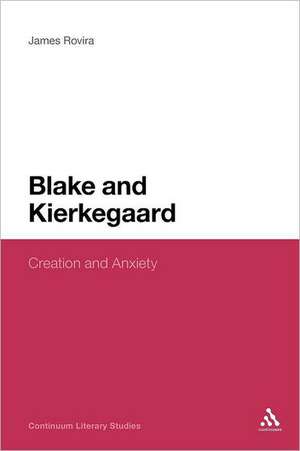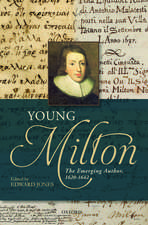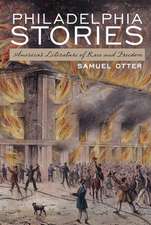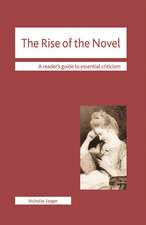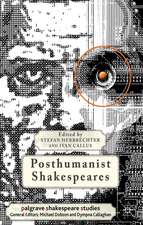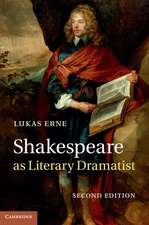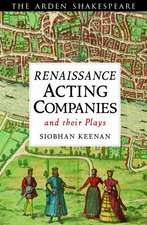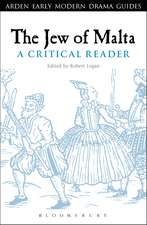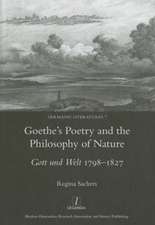Blake and Kierkegaard: Creation and Anxiety: Continuum Literary Studies
Autor Dr James Roviraen Limba Engleză Paperback – 19 oct 2011
| Toate formatele și edițiile | Preț | Express |
|---|---|---|
| Paperback (1) | 255.84 lei 6-8 săpt. | |
| Bloomsbury Publishing – 19 oct 2011 | 255.84 lei 6-8 săpt. | |
| Hardback (1) | 772.58 lei 6-8 săpt. | |
| Bloomsbury Publishing – 25 apr 2010 | 772.58 lei 6-8 săpt. |
Din seria Continuum Literary Studies
- 31%
 Preț: 889.23 lei
Preț: 889.23 lei -
 Preț: 257.03 lei
Preț: 257.03 lei - 23%
 Preț: 255.84 lei
Preț: 255.84 lei - 30%
 Preț: 773.65 lei
Preț: 773.65 lei - 23%
 Preț: 255.76 lei
Preț: 255.76 lei - 22%
 Preț: 889.49 lei
Preț: 889.49 lei - 22%
 Preț: 773.39 lei
Preț: 773.39 lei - 22%
 Preț: 889.49 lei
Preț: 889.49 lei - 13%
 Preț: 256.20 lei
Preț: 256.20 lei - 23%
 Preț: 255.76 lei
Preț: 255.76 lei - 31%
 Preț: 891.51 lei
Preț: 891.51 lei - 22%
 Preț: 889.55 lei
Preț: 889.55 lei - 31%
 Preț: 889.49 lei
Preț: 889.49 lei - 22%
 Preț: 772.65 lei
Preț: 772.65 lei - 22%
 Preț: 889.15 lei
Preț: 889.15 lei - 14%
 Preț: 771.84 lei
Preț: 771.84 lei - 22%
 Preț: 888.50 lei
Preț: 888.50 lei - 22%
 Preț: 772.98 lei
Preț: 772.98 lei - 30%
 Preț: 595.82 lei
Preț: 595.82 lei - 13%
 Preț: 258.59 lei
Preț: 258.59 lei - 22%
 Preț: 889.88 lei
Preț: 889.88 lei - 22%
 Preț: 256.29 lei
Preț: 256.29 lei - 14%
 Preț: 652.81 lei
Preț: 652.81 lei - 31%
 Preț: 889.49 lei
Preț: 889.49 lei - 23%
 Preț: 255.76 lei
Preț: 255.76 lei - 14%
 Preț: 772.17 lei
Preț: 772.17 lei - 22%
 Preț: 888.81 lei
Preț: 888.81 lei - 31%
 Preț: 771.59 lei
Preț: 771.59 lei - 22%
 Preț: 898.95 lei
Preț: 898.95 lei - 23%
 Preț: 256.02 lei
Preț: 256.02 lei - 31%
 Preț: 889.88 lei
Preț: 889.88 lei - 22%
 Preț: 256.59 lei
Preț: 256.59 lei - 22%
 Preț: 886.21 lei
Preț: 886.21 lei - 31%
 Preț: 772.58 lei
Preț: 772.58 lei - 31%
 Preț: 889.08 lei
Preț: 889.08 lei - 30%
 Preț: 774.46 lei
Preț: 774.46 lei - 31%
 Preț: 889.97 lei
Preț: 889.97 lei - 23%
 Preț: 254.84 lei
Preț: 254.84 lei - 28%
 Preț: 373.89 lei
Preț: 373.89 lei - 30%
 Preț: 774.20 lei
Preț: 774.20 lei - 31%
 Preț: 888.50 lei
Preț: 888.50 lei - 22%
 Preț: 889.63 lei
Preț: 889.63 lei - 31%
 Preț: 890.14 lei
Preț: 890.14 lei - 22%
 Preț: 888.50 lei
Preț: 888.50 lei - 22%
 Preț: 888.65 lei
Preț: 888.65 lei - 23%
 Preț: 262.25 lei
Preț: 262.25 lei
Preț: 255.84 lei
Preț vechi: 330.32 lei
-23% Nou
Puncte Express: 384
Preț estimativ în valută:
48.95€ • 51.25$ • 40.51£
48.95€ • 51.25$ • 40.51£
Carte tipărită la comandă
Livrare economică 05-19 aprilie
Preluare comenzi: 021 569.72.76
Specificații
ISBN-13: 9781441178060
ISBN-10: 1441178066
Pagini: 208
Dimensiuni: 156 x 234 x 11 mm
Greutate: 0.28 kg
Editura: Bloomsbury Publishing
Colecția Continuum
Seria Continuum Literary Studies
Locul publicării:London, United Kingdom
ISBN-10: 1441178066
Pagini: 208
Dimensiuni: 156 x 234 x 11 mm
Greutate: 0.28 kg
Editura: Bloomsbury Publishing
Colecția Continuum
Seria Continuum Literary Studies
Locul publicării:London, United Kingdom
Caracteristici
Examines the conjunction of literature and philosophy in Blake's mythological works and Kierkegaard's work
Notă biografică
James Rovira is Assistant Professor of English at Tiffin University, Ohio, USA.
Cuprins
Introduction
1. Blake and Kierkegaard: Shared Contexts
2. Blake, Kierkegaard, and the Socratic Tradition
3. Blake, Kierkegaard, and the Classical Model of Personality
4. Innocence, Generation, and the Fall in Blake and Kierkegaard
5. Creation Anxiety and The [First] Book of Urizen
Index
1. Blake and Kierkegaard: Shared Contexts
2. Blake, Kierkegaard, and the Socratic Tradition
3. Blake, Kierkegaard, and the Classical Model of Personality
4. Innocence, Generation, and the Fall in Blake and Kierkegaard
5. Creation Anxiety and The [First] Book of Urizen
Index
Recenzii
"Blake and Kierkegaard speak from the same instinct of the human condition and of man's states of anxiety and self-awareness. James Rovira offers a highly nuanced comparative reading of both author's concepts, of innocence and experience, creation and fall, that not only enhances our understanding of the works under consideration but affirms their abiding and life-affirming relevance to modern thought."
'Rovira's book is an involved but extremely rewarding book, one that delves fully into the complex and sophisticated dialectical processes involved in Kierkegaard's thought... Blake and Kierkegaard as a whole is a carefully thought-through and argued text.'
"Rovira's comparative study of William Blake and Søren Kierkegaard offers fresh perspectives related to both thinkers in their shared sociocultural moment. Rovira (English, Tiffin Univ.) frames his inquiry within creation anxiety--i.e., the persistent idea that creations will ultimately turn against one in destructive ways. The author makes connections between Frankenstein, Metropolis, and the Matrix trilogy in order to justify the persistence of this anxiety through the last 200 years and to imply that the apprehensions that impacted Blake's and Kierkegaard's thinking--apprehensions resulting from tensions between democracy and monarchy, science and religion, nature and artifice--apply today. Rovira compares and contrasts ideas relating to the progressive development of the subject to show how both resisted mechanistic Enlightenment psychologies that led to creation anxiety: in Blake's case, from innocence through experience toward visionary perspectives; in Kierkegaard's, the differentiation of self from natural, social, and mental environment. Accessible yet provocative, this book makes a significant contribution and offers critical challenges to the scholarship surrounding both figures, and close readings (and re-readings) expose lingering tensions between self and subjectivity. Generous notes and a substantial comprehensive bibliography round out this excellent study. Summing Up: Essential. Lower-division undergraduates and above. -- J. A. Saklofske, Acadia University"- CHOICE
'Rovira's book is an involved but extremely rewarding book, one that delves fully into the complex and sophisticated dialectical processes involved in Kierkegaard's thought... Blake and Kierkegaard as a whole is a carefully thought-through and argued text.'
"Rovira's comparative study of William Blake and Søren Kierkegaard offers fresh perspectives related to both thinkers in their shared sociocultural moment. Rovira (English, Tiffin Univ.) frames his inquiry within creation anxiety--i.e., the persistent idea that creations will ultimately turn against one in destructive ways. The author makes connections between Frankenstein, Metropolis, and the Matrix trilogy in order to justify the persistence of this anxiety through the last 200 years and to imply that the apprehensions that impacted Blake's and Kierkegaard's thinking--apprehensions resulting from tensions between democracy and monarchy, science and religion, nature and artifice--apply today. Rovira compares and contrasts ideas relating to the progressive development of the subject to show how both resisted mechanistic Enlightenment psychologies that led to creation anxiety: in Blake's case, from innocence through experience toward visionary perspectives; in Kierkegaard's, the differentiation of self from natural, social, and mental environment. Accessible yet provocative, this book makes a significant contribution and offers critical challenges to the scholarship surrounding both figures, and close readings (and re-readings) expose lingering tensions between self and subjectivity. Generous notes and a substantial comprehensive bibliography round out this excellent study. Summing Up: Essential. Lower-division undergraduates and above. -- J. A. Saklofske, Acadia University"- CHOICE
Descriere
Descriere de la o altă ediție sau format:
Apocalyptic nightmares that humanly-created intelligences will one day rise up against their creators haunt the western creative imagination. This study applies Kierkegaard's "Concept of Anxiety" to Blake's creation myths to explain how Enlightenment personality conceptions created fear of independently thinking beings.
Apocalyptic nightmares that humanly-created intelligences will one day rise up against their creators haunt the western creative imagination. This study applies Kierkegaard's "Concept of Anxiety" to Blake's creation myths to explain how Enlightenment personality conceptions created fear of independently thinking beings.
